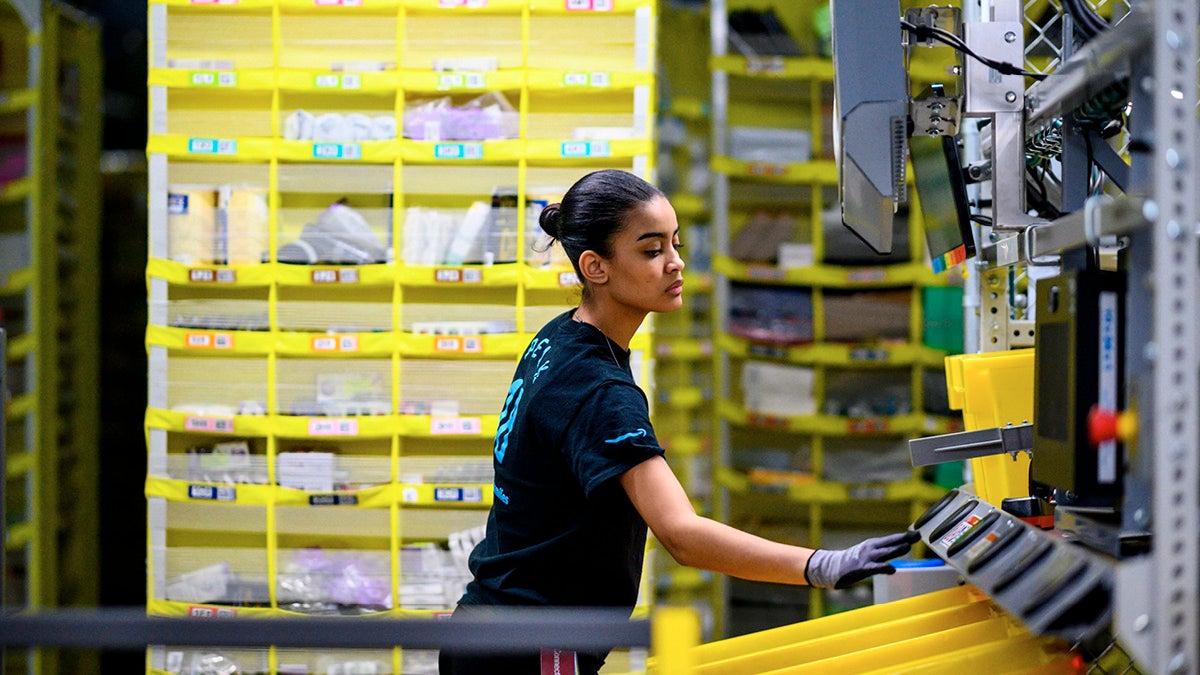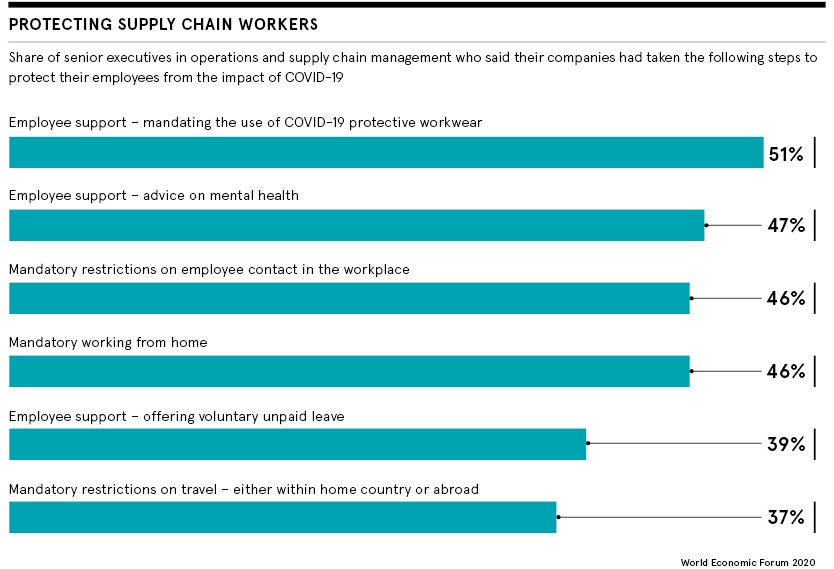
Countless key workers are keeping the country going during the coronavirus pandemic. Health workers have kept people alive, while businesses are managing to keep the economy going, albeit at a slower pace. But it is supply chain workers who have become the unexpected heroes.
Warehouse and distribution workers became key workers during lockdown, delivering goods to the nation’s doors, at a time when online shopping spiked, and ensuring supermarket shelves remained well stocked.
“The interest in supply chains has gone through the roof in the last three to four months,” says Dr Andrew Lahy, global head of strategy and innovation, at DSV Panalpina, and co-director of Cardiff University’s PARC Institute of Manufacturing, Logistics and Inventory, who has worked in supply chain operations for two decades. “It’s always been perceived as a bit boring,” he says. “It’s trucks, it’s warehouses, it’s sheds. It’s not the exciting stuff.”
But now it’s a major driver of employment as people recognise the importance of supply chain jobs to the economy. “What we’ve seen with coronavirus was just an acceleration of a change that was already happening,” says Lahy.
It’s always been perceived as a bit boring. It’s not the exciting stuff
COVID-19 came soon after Brexit, both of which attuned consumers to the idea of logistics and how their goods are produced and shipped. Supply chain operations is a fast-paced industry that requires quick problem-solving skills and working in the sector is now a legitimate career path.
Growing recognition for supply chain jobs
“People tend to recognise more what the supply chain is all about,” says Michael Bourlakis, professor of logistics, procurement and supply chain management at Cranfield School of Management. “With COVID-19, we’ve had people panic buying and then the role of the supply chain got some recognition, but to have a bigger or more lasting impact, I think there needs to be more awareness about its role.”
The supply chain got some recognition, but to have a bigger or more lasting impact, there needs to be more awareness about its role
This could come through increasing employment. Alongside career opportunities for those who undertake a supply chain management degree, more and more people are slotting into supply chain jobs from other lines of work.
During the early stages of the pandemic, even airline pilots reskilled as Tesco delivery drivers and Amazon took on thousands of new workers. The online retailer has since said it plans to fill another 7,000 supply chain jobs in the UK to meet demand this year and a further 20,000 posts to deal with the Christmas rush. It’s also building three new fulfilment centres where warehousing and distribution workers will work alongside robots to complete customer orders. In the United States and Canada, it plans to hire 100,000.
Ensuring supply chain workers treated fairly
Yet many big ecommerce companies have come under fire for their treatment of supply chain workers. Amazon has been criticised for allowing its workers to take only minimal breaks, while fashion retailer Boohoo’s supply chain was the subject of negative headlines during the height of the pandemic. With the rise of warehouse picking machines and the desire for evermore fast-paced delivery and logistics, ensuring employees are treated well is more important than ever.
“It’s the people, the processes and the technology as well now,” says Lahy. “The companies doing it well manage to combine all three of those things. Just having one or two is often not enough and, definitely, if you’re missing the people side, it doesn’t matter how good your processes and your technology are, in the end supply chains are about people.”
The rise of automation in the sector is growing, but it’s certainly still on the horizon, rather than at our fingertips. “We’re a long way from having autonomous deliveries to get products to consumers,” says Bourlakis. “It makes sense to me, whether it’s Tesco, Amazon or Morrisons, for big retailers to hire workers. It’s going to be a driver for sure, as long as this ecommerce increase will be sustainable, which I think it will be.”
Keeping those employees happy will be crucial; even in a once-in-a-lifetime downturn, people won’t stick with jobs if they are treated badly. And with public perception of supply chain workers never higher, employers would be foolish to mistreat their staff.
“There is still some work to be done to tackle this challenge in the supply chain,” Bourlakis concedes. “In every sector you might see issues.” But public views are shifting. “At the end of the day, food and products that come onto our tables wouldn’t be there unless efficient supply chains bring them,” he adds.
Regionalising supply chains
The supply chain is also mutating to adapt to demand, which means more jobs are required closer to home rather than abroad. “What we’re seeing increasingly now is companies accelerating this drive towards distributed manufacturing,” says Lahy.
When he started in the sector, manufacturing moved from the UK to Asia, with a separation of roles. Someone made a product in Asia, delivered a finished good to Europe, and it was picked and packed in the UK. “Increasingly, those two things – manufacturing and logistics – are merging. In the medium and long term, it’s combining those skills,” he says.

Workers looking to enter the industry will need to be multi-talented, with quick minds and problem-solving skills to unpick the logjams that occur. And companies that previously had not thought about their supply chain will now be seeing it with fresh eyes. “Some retailers didn’t have the supply chain as a priority, but I think it will become something to think about very carefully in the future,” says Bourlakis.
The future may be uncertain, especially when it comes to employment and the wider economy, but things are looking up for the supply chain.
Could supply chains be saviours of the job market?
The UK job market isn’t looking good. The unemployment rate rose to 4.1 per cent in the three months to July, with nearly 700,000 people disappearing from the nation’s payroll since March. The unemployment rate among 16 to 24 year olds is 13.4 per cent.
Bar workers, restaurant staff and temporary jobs are all off the table. Pinch points are occurring in the job market. But could the supply chain be a lifeline, bucking the downward trend of employment?
“The damage to the UK labour market over the near term is likely to be relatively uneven with sectors most acutely impacted by ongoing restrictions such as consumer-focused firms hardest hit, while those able to function more easily are likely to see strong demand for labour,” says Suren Thiru, head of economics at the British Chambers of Commerce.
“Support – assistance with retraining costs, cost of employment – to help people shift from struggling sectors to those that are growing can limit the expected surge in unemployment.”
That’s borne out with companies like Amazon hiring. Dr Andrew Lahy, global head of strategy and innovation, at DSV Panalpina, says: “There was a drop when coronavirus started, but I’m seeing people trying to hire now. Companies are realising they have to adapt their supply chains, and they need the skills and people who can do that.”

Countless key workers are keeping the country going during the coronavirus pandemic. Health workers have kept people alive, while businesses are managing to keep the economy going, albeit at a slower pace. But it is supply chain workers who have become the unexpected heroes.
Warehouse and distribution workers became key workers during lockdown, delivering goods to the nation’s doors, at a time when online shopping spiked, and ensuring supermarket shelves remained well stocked.
